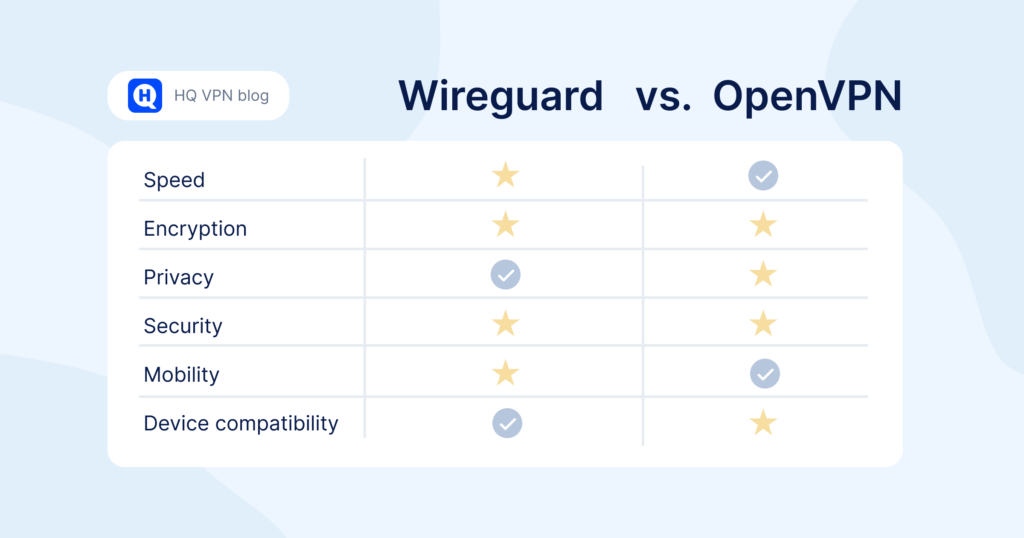

WireGuard vs OpenVPN: A Guide to VPN Protocols

Trying to decide between WireGuard vs OpenVPN for your VPN needs? Both of these protocols offer unique advantages, but which one is right for you?
In this comparison review, we’ve put these two VPN services head-to-head to help you make an informed decision. Join us as we delve into the most essential details of their features, security, and performance to find out which one comes out on top.
OpenVPN
OpenVPN is a free and open-source VPN protocol that was first released in 2001. It is one of the most widely-used VPN protocols in the world and is known for its versatility and robust security features.
OpenVPN uses the OpenSSL library and SSL/TLS protocols to secure the network, making it highly resistant to tampering and eavesdropping. It is also highly configurable and can be customized to suit the needs of individual users and organizations.
HQ VPN leverages the power of OpenVPN to offer users a highly secure, versatile, and fast VPN solution. Whether you need to protect your online privacy, bypass internet censorship, or secure your corporate network, HQ VPN has you covered. So why not give it a try and see what benefits it can bring to you!
Pros
- Security. OpenVPN uses a combination of SSL/TLS protocols and the OpenSSL library to encrypt data and secure the network. This makes it highly resistant to tampering and eavesdropping, and one of the most secure VPN protocols available.
- Versatility. OpenVPN is a highly configurable protocol that can be tailored to meet the specific needs of individual users and organizations. It can be run over both UDP and TCP protocols and supports a wide range of operating systems, including Windows, macOS, Linux, Android, and iOS.
- Scalability. OpenVPN can be easily set up to support thousands of concurrent users, making it ideal for use in large organizations and enterprises. It also supports a wide range of operating systems, including Windows, macOS, Linux, Android, and iOS.
- Bypass censorship. One of the key features of OpenVPN is its ability to tunnel through firewalls and other network restrictions, making it ideal for use in countries with strict internet censorship. Additionally, OpenVPN can run over both UDP and TCP protocols, providing users with the option to choose the protocol that best suits their needs.
- Speed. OpenVPN is known for its fast and reliable performance, making it ideal for use in situations where speed and reliability are a concern.
- Ease of use. OpenVPN has a large and active user community that provides support and resources to users, making it easy to get started and use.
Cons
Like all VPN protocols, OpenVPN has its pros and cons. While it is a highly secure, versatile, and fast VPN protocol, there are some aspects of OpenVPN that some users may find less desirable. Here are a few of the cons of using OpenVPN.
- Resource intensive. OpenVPN requires more system resources than some other VPN protocols, which can slow down older or less powerful devices.
- Configuration. OpenVPN is a highly configurable VPN protocol, which can be a double-edged sword. While it offers users a great deal of flexibility and customization options, the level of configuration required can be overwhelming for some users.
- Complex set-up. When we compare Wireguard vs OpenVPN, setting up OpenVPN can be a bit more complex than other VPN protocols, which can be a barrier to entry for some users.
- Compatibility. While OpenVPN supports a wide range of operating systems, it may not be compatible with all devices. Additionally, some devices may require additional software or configuration to use OpenVPN.
WireGuard
WireGuard is a cutting-edge VPN protocol that stands out in a Wireguard vs OpenVPN duo for its simplicity, speed, and security. With just a few thousand lines of code, WireGuard is lightweight and efficient, making it faster and less resource-intensive compared to other VPN protocols. It is designed to be easy to use and has a straightforward configuration process, making it ideal for both technical and non-technical users.
WireGuard’s high speed and strong encryption algorithms make it an excellent choice for those who value speed and privacy.
Pros
Here are some of the key technical characteristics and features of WireGuard.
- Lightweight. WireGuard is designed to be lightweight and efficient, requiring only a few thousand lines of code compared to hundreds of thousands for other VPN protocols. This makes it faster and less resource-intensive.
- Simple to use. WireGuard is designed to be simple to use, with a straightforward configuration process that is easy to understand. This makes it ideal for both technical and non-technical users.
- High speed. WireGuard is known for its high speed, making it ideal for use in situations where speed is a concern.
- Strong security. WireGuard uses strong encryption algorithms and modern cryptographic techniques to secure the network and protect users’ privacy.
- Cross-platform support. WireGuard supports a wide range of operating systems, including Windows, macOS, Linux, Android, and iOS.
- Open-source. WireGuard is open source, which means that the code is available for anyone to inspect and review. This helps to ensure that the protocol is secure and free from backdoors.
Cons
While WireGuard has many advantages, like all VPN protocols, it also has some drawbacks. Here are a few of the cons of using WireGuard.
- Limited platform support. While WireGuard supports a wide range of operating systems, it may not be available on all devices, especially older or less common ones.
- New and unproven. WireGuard is a relatively new VPN protocol, and while it has been well-received by the VPN community, it hasn’t been thoroughly tested over time like some older VPN protocols.
- Lack of features. Compared to other VPN protocols, WireGuard has a relatively limited feature set, which may not meet the needs of all users.
- No centralized management. WireGuard does not have a centralized management system, which can make it more challenging to deploy and manage on a large scale.
Despite these cons, WireGuard remains an excellent choice for many VPN users. Its focus on simplicity, speed, and security makes it a great option for those looking for a VPN that just works. By weighing the pros and cons, you can determine if WireGuard is the right VPN protocol for you.
What protocols does HQ VPN use?
At HQ VPN, we understand that security and speed are both crucial for a smooth and enjoyable online experience. That’s why we’ve chosen to use both OpenVPN and IPSec protocols in our service.
But we don’t just stop at security. We also understand the importance of speed. That’s why we’ve paired OpenVPN with IPSec, another protocol known for its fast connection speeds. IPSec is a lightweight protocol that can be easily configured for different types of connections, making it ideal for streaming and gaming.
By using both OpenVPN and IPSec, HQ VPN is able to provide a balance of security and speed that’s unmatched by other VPNs. With HQ VPN, you can enjoy the peace of mind that comes with knowing your online activity is always protected, while still being able to stream and game at lightning-fast speeds.
Try HQ VPN now and experience the best of both worlds!
TL;DR: OpenVPN vs WireGuard
Both OpenVPN and WireGuard are excellent VPN protocols, and the best choice for you will depend on your specific needs and preferences. Here’s a brief summary for comparison:

OpenVPN is a well-established VPN protocol that is known for its flexibility, security, and wide range of features. It is a good choice for users who need a VPN for a variety of different purposes, including privacy, security, and bypassing censorship. However, it can be complex to set up and use, and it is not as fast as some other VPN protocols, like WireGuard.
WireGuard, on the other hand, is a new and innovative VPN protocol that is designed to be simple, fast, and secure. It is lightweight and efficient, making it a great choice for those who value speed and don’t need a lot of features. However, it is relatively new and untested compared to OpenVPN, and it may not be available on all platforms or meet the needs of all users.
TL;DL OpenVPN vs Wireguard: if you value flexibility, security, and a wide range of features, OpenVPN may be the best choice. But if you prioritize speed and simplicity, WireGuard may be a better option.
If you want to learn more about VPN protocols, check out our article on PPTP where we explain how it works and review its benefits and drawbacks.



